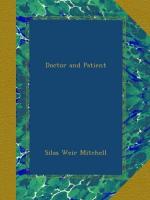Hence it is that very few physicians did more in the last three centuries as regards the temperature of the body than speak of it as high or low. Sanctorius was too far ahead of his time to teach us the true value of medical thermometry. It was forgotten for many a day. In the last century, in Dehaen and Hunter, it again receives some notice, and again drops out of use. At last we are ripe for it, and Wunderlich, in a classical book, about twenty-five years ago, puts it in a position of permanent utility. The physician of to-day knows more both of fever and of its consequences, and finds in his thermometer an indispensable ally.
Within but a few years the instruments of precision have so multiplied that a well-trained consultant may be called on to know and handle as many tools as a mechanic. Their use, the exactness they teach and demand, the increasing refinement in drugs, and our ability to give them in condensed forms, all tend towards making the physician more accurate, and by overtaxing him, owing to the time all such methodical studies require, have made his work such that only the patient and the dutiful can do it justice.
Primary examinations of chest, heart, and other viscera are long and troublesome, and the first study of a case which is at all difficult, demands such time as it is increasingly hard for the busy to find. A good test for laymen in acute cases is the methodical manner in which a physician of modern training goes over the case, nor is his preciseness as to doses and medicines less worthy of note. I used to watch with interest the late Professor P. at a sick-bed. The grave and tranquil interest, the pauses for thought, the swift thoroughness of examination, and then the delay, with, “Please, nurse, let me taste that last medicine,” were full of good lessons. Any consultant could tell you what a rare quality is this union of precision and thoroughness.
Our profession has in its work enough of true difficulties, but we still owe many of our worst errors to want of absolutely complete study of our cases, and with the careless these slips are obvious enough to enable any one who is watchful to sit in judgment on the failures. The more delicate illustrations of the fine union of qualities which attain the highest triumphs are, of course, only seen and comprehended by physicians, whose general opinion on their fellows is in the end almost always a just one. There is a potent combination of alertness in observation, with a never-satisfied desire to know even the trifles of a case, which, with sagacity, gives a medical mental character as rare as it is valuable.
For such men there are no trifles, and, on entering a sick-room, they seem to absorb at a glance matters which escape others, and yet to the end are still so quietly observant and searching that they seem never to be quite content with what they have learned. Not to know surely is to them a form of unhappiness.




